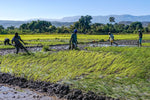
Haiti’s Agriculture Crisis: Can Diaspora Investment Help?
, by Seo Guy , 3 min reading time

, by Seo Guy , 3 min reading time
Haiti agriculture / food security are inseparable realities: when farms struggle, household nutrition and community stability suffer. Fields that once supplied local markets now face fragile inputs, inconsistent rainfall, and expensive transport. This pressure explains the decline of Haitian agriculture, seen in thinner harvests and higher prices at the market. To reverse course, families and co-ops need reliable seeds and water, fair buyers, and logistics that don’t eat margins. That is where diaspora capital and know-how can shift the ground—literally.
The decline of Haitian agriculture shows up first in farmers’ ledgers. Seed and fertilizer costs spike; irrigation pumps fail; feeder roads erode after storms, turning a quick trip to market into an all-day gamble. Without storage and drying capacity, growers must sell early at discounts. When credit is available, it’s often too costly or misaligned with planting/harvest cycles. Add climate volatility—drought one season, floods the next—and you get shrinking yields and higher risks. For families, this isn’t a trend line; it’s tonight’s dinner and next semester’s school fees.
Talk to producers and farmer stories & challenges form a familiar pattern. A bean farmer explains how a broken canal cut yields in half. A plantain grower shows bruised fruit from bumpy roads and delayed pickups. A small co-op treasurer flips through notebooks tracking debts to input dealers. These farmer stories & challenges highlight simple truths: timing matters more than slogans; a working pump beats a press release; and buyers who pay on time are as valuable as rain.
Answering how diaspora keeps Haiti fed starts with practical commitments. Diaspora buyers can pre-contract a portion of harvests at fair prices, giving co-ops leverage to negotiate inputs. Modest funds buy drying racks, tarps, moisture meters, and sealable bags that reduce post-harvest loss. Training on soil health and bookkeeping gives farmers the data to bargain well. Transparent purchase orders and scheduled pickups turn hope into cash flow—and cash flow into food on neighborhood tables. In short, how diaspora keeps Haiti fed is a story of steady demand and shared standards.
If you want to support Haiti agriculture / food security, steer money where bottlenecks are tightest. Micro-loans matched to crop calendars prevent distress sales. Revolving funds tied to co-op milestones (e.g., “reach X moisture standard, unlock Y%”) reward quality. Group transport arrangements drop per-sack costs and reduce bruising. Warehouse receipts let farmers borrow against stored grain rather than sell cheap after harvest. Each tool addresses a line in farmer stories & challenges—and each tool scales when the diaspora organizes.
Sustained Haiti agriculture / food security also needs value addition at home. Milling grains, drying fruit, grading beans, or processing spices locally keeps margins in farming towns. When co-ops meet safety standards, they supply not just city shops but also school meal programs—a direct line from the field to child nutrition. That’s how the decline of Haitian agriculture is reversed: small, repeated improvements that compound into confidence and calories.
The fix for Haiti agriculture / food security is not glamorous; it is granular. Track moisture, log prices, audit books, repair canals, and keep trucks on schedule. Celebrate co-ops that hit targets. Publish purchase histories so trust grows. In time, farmer stories & challenges evolve into farmer successes and strong markets—clear evidence of how diaspora keeps Haiti fed by matching love with logistics.